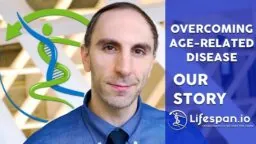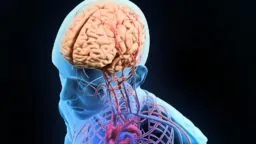Rejuvenation Roundup October 2023
- David Sinclair has made some optimistic projections, but he's not alone.

As we head towards the end of fall, biotechnology companies have made greater investments into rejuvenation as research advancements have shown what might be possible. Here’s what’s happened in October.
LEAF News
 Help Us Solve Aging With Cryptocurrency: If you want to contribute to Lifespan.io and use cryptocurrency, there is a great opportunity happening right now to support our work! We are currently fundraising on Giveth as part of our Optimism Round. You can find our fundraiser over at the Lifespan.io Giveth page.
Help Us Solve Aging With Cryptocurrency: If you want to contribute to Lifespan.io and use cryptocurrency, there is a great opportunity happening right now to support our work! We are currently fundraising on Giveth as part of our Optimism Round. You can find our fundraiser over at the Lifespan.io Giveth page.
Team and activities
Decentralized Science is Key to Funding Aging Research: We believe that DeSci projects are a way to speed up progress in aging research. This is why our conference this year included longevity, rejuvenation, and Desci in its talks, workshops, and panels.
 The Longevity World Meets in Dublin for a Second Time: Last year’s inaugural Longevity Summit Dublin conference was a good start. Its second iteration, held in August this year, was universally acclaimed for being even bigger and better. Just like the last time, this conference was marked by a considerable presence of longevity advocates alongside scientists and entrepreneurs.
The Longevity World Meets in Dublin for a Second Time: Last year’s inaugural Longevity Summit Dublin conference was a good start. Its second iteration, held in August this year, was universally acclaimed for being even bigger and better. Just like the last time, this conference was marked by a considerable presence of longevity advocates alongside scientists and entrepreneurs.
Lifespan News
David Sinclair on Age Reversal: At Abundance 360, David Sinclair made quite a number of encouraging comments about the future of aging research, including methods of resetting epigenetics to a youthful state. Emmett Short discusses these comments.
Interviews
 Pfizer-Backed VitaDAO Launches Biotech Company: VitaDAO, a decentralized autonomous organization (DAO), has launched its first biotech, Matrix Biosciences. The launch is in collaboration with Vera Gorbunova from the University of Rochester’s Aging Research Center.
Pfizer-Backed VitaDAO Launches Biotech Company: VitaDAO, a decentralized autonomous organization (DAO), has launched its first biotech, Matrix Biosciences. The launch is in collaboration with Vera Gorbunova from the University of Rochester’s Aging Research Center.
Journal Club
DNA Methylation Clocks and Their Limitations: The Journal Club has returned to the Lifespan.io Facebook page, where we discussed the new paper from Conboy et al. that examines current DNA meythlation clocks and their limitations in the context of aging. The Conboys themselves were part of this discussion.
Advocacy and Analysis
 Dublin Longevity Declaration Off to a Good Start: The Dublin Longevity Declaration, an unprecedented initiative that aims to change humanity’s perception of aging, is scooping signatures at a record pace.
Dublin Longevity Declaration Off to a Good Start: The Dublin Longevity Declaration, an unprecedented initiative that aims to change humanity’s perception of aging, is scooping signatures at a record pace.
Research Roundup
NMN Reduces Systolic Blood Pressure in Clinical Trial: Combining human clinical trial research, cellular analysis, and mouse studies, researchers publishing in the Nature journal Signal Transduction and Targeted Therapy have discovered a relationship between NAD+, hypertension, and the immune signal CD38.
 Blood Biomarkers as Predictors of Longevity: A recent study’s authors investigated whether biomarkers measured earlier in life can predict if someone will live to their 100th birthday. Previous research has found that people who become centenarians have fewer disabilities, comorbidities, and hospitalizations earlier in life.
Blood Biomarkers as Predictors of Longevity: A recent study’s authors investigated whether biomarkers measured earlier in life can predict if someone will live to their 100th birthday. Previous research has found that people who become centenarians have fewer disabilities, comorbidities, and hospitalizations earlier in life.
Improving Quality and Length of Life with Stem Cells: A review article published in Stem Cell Research & Therapy has described the ways in which mesenchymal stromal cells (MSCs) are being developed to treat diseases, including age-related diseases.
 A Mutation Improves Lifelong Memory in Worms and Mice: A study published in Cell Reports has shown how the activation of a common protein in neurons improves memory in both worms and mammals.
A Mutation Improves Lifelong Memory in Worms and Mice: A study published in Cell Reports has shown how the activation of a common protein in neurons improves memory in both worms and mammals.
SIRT2 Works Against Cardiac Aging in Mice and Monkeys: Working with non-human primates, scientists have discovered that the protein SIRT2, a member of the sirtuin family, might play an important role in slowing cardiac aging.
 Correlations Between Omega-3 Fatty Acids and Brain Function: The authors of a study published in Brain Sciences have investigated the relationship between omega-3 fatty acid levels, brain volume, and cognitive function.
Correlations Between Omega-3 Fatty Acids and Brain Function: The authors of a study published in Brain Sciences have investigated the relationship between omega-3 fatty acid levels, brain volume, and cognitive function.
Why Long-Lived Animals Are Needed for Life Extension Studies: A team of researchers, including Matt Kaeberlein and Brian Kennedy, has published a preprint discussing the necessity of using long-lived animals in life extension research.
 Study Suggests a New Mechanism of Cellular Senescence: Scientists have found that leakage of mitochondrial DNA in senescent cells is a major cause of their pro-inflammatory activity, and it can be targeted without clearing those cells out.
Study Suggests a New Mechanism of Cellular Senescence: Scientists have found that leakage of mitochondrial DNA in senescent cells is a major cause of their pro-inflammatory activity, and it can be targeted without clearing those cells out.
Spermidine May Improve Egg Health and Fertility: Reporters publishing in Nature Aging have identified a metabolite that appears to restore the age-related loss of quality of egg cells (oocytes) in mice. While it was originally found in semen, the metabolite spermidine has been found in many different tissues, including ovaries.
 Treating Hypertension May Reduce Dementia Risk: Research published in JAMA Geriatrics analyzed the link between blood pressure, hypertension, and the risk of dementia. Published research has been inconsistent regarding the link between hypertension and dementia.
Treating Hypertension May Reduce Dementia Risk: Research published in JAMA Geriatrics analyzed the link between blood pressure, hypertension, and the risk of dementia. Published research has been inconsistent regarding the link between hypertension and dementia.
A Link Between Genetic Damage and Cardiovascular Disease: In a paper published in Aging, researchers have explored the relationship between DNA damage and aging of the blood vessels. Cardiovascular disease is the single most common cause of death in the world.
 High-Protein Diets Have Few Benefits in Mice: A new study suggests that high protein intake leads to fat gain and worse metabolic outcomes, but some of these effects are blocked by resistance training.
High-Protein Diets Have Few Benefits in Mice: A new study suggests that high protein intake leads to fat gain and worse metabolic outcomes, but some of these effects are blocked by resistance training.
Remembering Where We Are in Alzheimer’s Research: A pair of neurologists have published a review in Cell discussing the current state of Alzheimer’s therapies, including drugs in early development, treatments in clinical trials, and therapies that are prescribed today.
 Sleep Disruption Leads to Cellular Senescence in Mice: A new preprint suggests that continuous sleep disruption might drive health problems via increased cellular senescence in visceral fat tissue.
Sleep Disruption Leads to Cellular Senescence in Mice: A new preprint suggests that continuous sleep disruption might drive health problems via increased cellular senescence in visceral fat tissue.
New Insight Into How APOE4 Drives Alzheimer’s: A new study suggests that the gene variant APOE4 promotes Alzheimer’s disease by increasing gliosis, but this effect can be blocked by inhibiting the protein HMGB1.
 Creating a New Clock with Medical Records: Assisted by TruDiagnostic, a team of researchers has published a preprint paper in which -omics data has been used to create an epigenetic methylation clock.
Creating a New Clock with Medical Records: Assisted by TruDiagnostic, a team of researchers has published a preprint paper in which -omics data has been used to create an epigenetic methylation clock.
Cannabinoid Therapy as a Treatment for Alzheimer’s Disease: The authors of a recent paper have reviewed the literature regarding the potential of cannabinoids to treat Alzheimer’s disease.
 Prostate Enlargement and Metabolic Syndrome Linked: Researchers publishing in Aging have explained a relationship between inflammation, metabolic syndrome, and prostate enlargement.
Prostate Enlargement and Metabolic Syndrome Linked: Researchers publishing in Aging have explained a relationship between inflammation, metabolic syndrome, and prostate enlargement.
Intermittent Fasting Partially Offsets Alzheimer’s in Mice: Scientists have found that intermittent fasting can ameliorate Alzheimer’s in mice by improving sleep patterns. Both groups consumed the same amount of food and maintained the same body weight, so any impact that it had was not due to caloric restriction.
 Resveratrol May Improve Mitochondrial Function: According to a review published in Food Science and Human Wellness, resveratrol has a positive impact on mitochondrial dysfunction, one of the hallmarks of aging.
Resveratrol May Improve Mitochondrial Function: According to a review published in Food Science and Human Wellness, resveratrol has a positive impact on mitochondrial dysfunction, one of the hallmarks of aging.
Plasma from Young Pigs Halves Old Rats’ Epigenetic Age: A new study used a plasma fraction from young pigs to robustly reduce the biological age of old rats. This could potentially open doors to rejuvenation in humans.
 A Key Reason Why Brain Protection Declines with Aging: Researchers publishing in GeroScience have discovered the molecular mechanisms through which fibrinogen, a protein that increases with aging, causes toxic compounds to more easily leak into the brain.
A Key Reason Why Brain Protection Declines with Aging: Researchers publishing in GeroScience have discovered the molecular mechanisms through which fibrinogen, a protein that increases with aging, causes toxic compounds to more easily leak into the brain.
Metabolically Healthy Obesity Still Increases Diabetes Risk: A new study suggests that while it is possible to be both obese and healthy, this phenotype considerably increases the risk of getting diabetes, mainly because it is hard to maintain.
Calorie restriction modulates the transcription of genes related to stress response and longevity in human muscle: Two years of sustained CR in humans positively affected skeletal muscle quality, and impacted gene expression and splicing profiles of biological pathways affected by CR in model organisms.
Diet strategies for promoting healthy aging and longevity: An epidemiological perspective: This narrative review aims to summarize recent findings on the dietary factors influencing chronic diseases and longevity, primarily from large cohort studies.
The effects of olive oil consumption on cognitive performance: a systematic review: The consumption of olive oil was found to enhance cognitive functioning and to reduce cognitive decline. Further large-scale investigations are required to strengthen this conclusion.
Alcohol consumption and epigenetic age acceleration across human adulthood: These findings suggest that alcohol consumption is associated with greater biological aging quantified by epigenetic aging metrics, which may mediate the association of alcohol consumption with quantitative traits, such as hypertension.
Dose–response effects of resistance training on physical function in frail older Chinese adults: Both the intensity and volume of exercise were found to greatly value physical function in frail older adults. Low–moderate-intensity resistance training and low–moderate-volume resistance training also had some advantages.
Muscle Mass and Strength Gains Following Resistance Exercise Training in Older Adults: Prolonged resistance exercise training increases muscle mass, strength, and physical performance in the aging population,
The effect of glycine administration on the characteristics of physiological systems in human adults: The nervous system demonstrated the most positive effects, including improved psychiatric symptoms from longer-term glycine administration in psychiatric populations.
Intersection clock reveals a rejuvenation event during human embryogenesis: Together, these data suggest that human embryos are rejuvenated during early embryogenesis.
Nanotopographical Cues Tune the Therapeutic Potential of Extracellular Vesicles for the Treatment of Aged Skeletal Muscle Injuries: The beneficial effects of the sequential EV treatment strategy were further validated in vivo, as evidenced by increased myofiber size and improved functional recovery.
Bifidobacterium bifidum and Lactobacillus paracasei alleviate sarcopenia and cognitive impairment in aged mice: This study found that probiotics do this by regulating gut microbiota-mediated signaling pathways.
The association of herpes zoster and influenza vaccinations with the risk of developing dementia: Both zoster vaccine for prevention of shingles / herpes zoster and influenza vaccine to prevent influenza were associated with diminished risk of dementia.
Low-molecular-weight collagen peptide supplement promotes healthy skin: Taken together, these findings suggest that low-molecular-weight collagen peptide supplementation can safely enhance human skin wrinkling, hydration, elasticity, and whitening properties.
Prim-O-glucosylcimifugin ameliorates aging-impaired endogenous tendon regeneration by rejuvenating senescent tendon stem/progenitor cells: Thus, the strategy of pharmacological intervention with the deep learning-predicted compound POG could rejuvenate aged TSPCs and improve the regenerative capacity of aged tendons.
Survival improvements of marine mammals in zoological institutions mirror historical advances in human longevity: This study found that life expectancy increased up to 3.40 times, and first-year mortality declined up to 31%, during the last century in zoos.
News Nuggets
 Nobel Prize in Medicine Goes to Two mRNA Vaccine Researchers: Katalin Karikó and Drew Weissman received this year’s Nobel Prize in Physiology or Medicine for a groundbreaking discovery that facilitated the development of mRNA vaccines and can be relevant to future anti-aging therapies.
Nobel Prize in Medicine Goes to Two mRNA Vaccine Researchers: Katalin Karikó and Drew Weissman received this year’s Nobel Prize in Physiology or Medicine for a groundbreaking discovery that facilitated the development of mRNA vaccines and can be relevant to future anti-aging therapies.
GenAI Biotech Gero Raises $6M to Find Root Causes of Aging: Gero, a biotechnology company focused on aging and chronic diseases, has closed $6M in a Series A extension round. This funding round positions Gero to continue internal drug development programs, grow its scientific team to boost platform technology development, and expand its US presence.
 Turn Bio on Track to Have First Cell Rejuvenation in Clinic: Turn Biotechnologies, a cell rejuvenation company developing novel mRNA medicines for untreatable, age-related conditions, received positive feedback during an FDA meeting to review progress and plans for its therapeutic treatment to rejuvenate skin cells.
Turn Bio on Track to Have First Cell Rejuvenation in Clinic: Turn Biotechnologies, a cell rejuvenation company developing novel mRNA medicines for untreatable, age-related conditions, received positive feedback during an FDA meeting to review progress and plans for its therapeutic treatment to rejuvenate skin cells.
BioAge Labs Announces Plans for Phase 2 Trial of BGE-105: BioAge, a clinical-stage biotechnology company developing therapeutics that target the molecular causes of aging to extend healthy human lifespan, announced plans to initiate a Phase 2 trial of its oral apelin receptor agonist BGE-105 (azelaprag) co-administered with the GLP-1/GIP receptor agonist tirzepatide for treatment of obesity.







